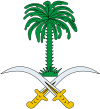- Telecommunications in Saudi Arabia
-
Telephones - main lines in use: 3,317,550 (2002)
Telephones - mobile cellular: 21,500,000 (2007)
note: In 2004, the Saudi Telecom Company (STC) monopolization was broken by authorizing Etihad Etisalat/Mobily to compete in mobile communication, in June 2009 GO Telecom (Etihad Atheeb Telecom) or "جو" also entered the market.Digital Radio Trunking- 100,000 (Unofficial):
In late 2005, bravO! Telecom was launched as the country's digital radio trunking operator under a B.O.T agreement with the incumbent operator STC, with an estimated 100,000 subscribers as of Nov'07.Telephone system: modern system
domestic: extensive microwave radio relay and coaxial and fiber-optic cable systems
international: microwave radio relay to Bahrain, Jordan, Kuwait, Qatar, UAE, Yemen, and Sudan; coaxial cable to Kuwait and Jordan; submarine cable to Djibouti, Egypt and Bahrain; satellite earth stations - 5 Intelsat (3 Atlantic Ocean and 2 Indian Ocean), 1 Arabsat, and 1 Inmarsat (Indian Ocean region)Radio broadcast stations: AM 43, FM 31, shortwave 2 (1998)
Radios: 6.25 million (1997)
Television broadcast stations: 117 (1997)
Televisions: 5.1 million (1997)
Internet Service Providers (ISPs): 22 (2005)
Internet Users: 4,800,000 (December 2006)
Country code (Top level domain): .sa
Saudi Post
Contents
Broadband Internet access
An ADSL service in Saudi Arabia has become available since 2001. As part of its monopoly on all methods of communication in Saudi Arabia, the Saudi Telecom Company is the only complete provider, though several ISPs are available, with the permission of STC.
STC is the only provider for telephone lines in Saudi Arabia. For this reason customers have to pay two fees, one to STC for activation of the ADSL service across the telephone line, and a second to an ISP to provide Internet service across the ADSL line. STC has been highly criticized for their service in providing ADSL access as customers had to wait many months to receive ADSL service on their phone lines. In 2006, STC had invested in increasing the size of their ADSL infrastructure and since then the wait times had improved, but many customers are still on waiting lists.
As of 2011, the maximum Internet speed available is currently 100 Mbit/s.
Speed Rate 128 kbit/s 99 S.A.R (26.39$) 256 kbit/s 149 S.A.R (39.73$) 512 kbit/s 199 S.A.R (53.06$) 1 Mbit/s 211 S.A.R (56.26$) 2 Mbit/s 222 S.A.R (59.19$) 4 Mbit/s 244 S.A.R (65.06$) 8 Mbit/s to 20 Mbit/s 296 S.A.R (78.93$) 100 Mbit/s 499 S.A.R (133.06$) As of October 2006, the 20 Internet service providers in Saudi Arabia became connected through "Data service provider" -licensed companies, such as Saudi Telecom Company. The ISPs were previously connected through KACST (King Abdulaziz City for Science and Technology), who was also responsible for DNS and filtering traffic. Since October 2006 the Communications and Information Technology Commission is responsible for DNS and filtering services.[1]
There are several reasons for the service being unpopular, in particular the unreasonably expensive prices and incompetent low-quality service. Perhaps this was proved when STC submitted a request to enter neighboring Egypt as a provider and was refused due to lack of experience, staff, equipments and such.
In late 2005 it was announced that a company by the name of Electronet would start providing broadband connections through electric lines by mid 2006. However as of early 2009 the service has not been implemented and the company's website has been idle for years. Some of the developed countries are having trouble implementing internet connections via power lines so it is highly unlikely this technology will ever appear in Saudi Arabia. Electrone is dissolved
There are huge public complaints about the Internet services in Saudi Arabia all of which falls on deaf ears since there is no reason or force pressuring the monopoly.
See also
- Sahara Net
- Integrated Telecom Company
- Saudi Telecom Company
- bravO! Telecom
- Bayanat Al Oula for Network Services
- Saudi Arabia
- Etihad Etisalat/Mobily
References
- ^ "Communication and Information Technology Commission, Saudi Arabia, Annual Report 2005" (Press release). Communication and Information Technology Commission. http://www.citc.gov.sa/NR/rdonlyres/5F77A781-6ECB-43FB-8F5E-1C46CE907BE4/0/AnnualReportEng.pdf. Retrieved 2007-01-22.
External links
Best Of Riyadh - A blog that gives information about Riyadh Saudi Arabia
 Saudi Arabia topics
Saudi Arabia topics- Index
- Outline
History 
Geography Law Politics - King
- Cabinet
- Allegiance Council
- National Security Council
- Consultative Assembly
- Foreign relations
- Nuclear program
- Mabahith (secret police)
Military Economy - Saudi riyal
- Tadawul (stock exchange)
- Saudi Arabian Monetary Agency
- Agriculture
- Companies
- Energy
- Irrigation
- Oil
- Oil reserves
- OPEC
- Transport
- Telecommunications
- Tourism
- Water supply and sanitation
Society Culture Symbols Telecommunications in Asia Sovereign
states- Afghanistan
- Armenia
- Azerbaijan
- Bahrain
- Bangladesh
- Bhutan
- Brunei
- Burma (Myanmar)
- Cambodia
- People's Republic of China
- Cyprus
- East Timor (Timor-Leste)
- Egypt
- Georgia
- India
- Indonesia
- Iran
- Iraq
- Israel
- Japan
- Jordan
- Kazakhstan
- North Korea
- South Korea
- Kuwait
- Kyrgyzstan
- Laos
- Lebanon
- Malaysia
- Maldives
- Mongolia
- Nepal
- Oman
- Pakistan
- Philippines
- Qatar
- Russia
- Saudi Arabia
- Singapore
- Sri Lanka
- Syria
- Tajikistan
- Thailand
- Turkey
- Turkmenistan
- United Arab Emirates
- Uzbekistan
- Vietnam
- Yemen
States with limited
recognition- Abkhazia
- Nagorno-Karabakh
- Northern Cyprus
- Palestine
- Republic of China (Taiwan)
- South Ossetia
Dependencies and
other territories- Christmas Island
- Cocos (Keeling) Islands
- Hong Kong
- Macau
Categories:
Wikimedia Foundation. 2010.
